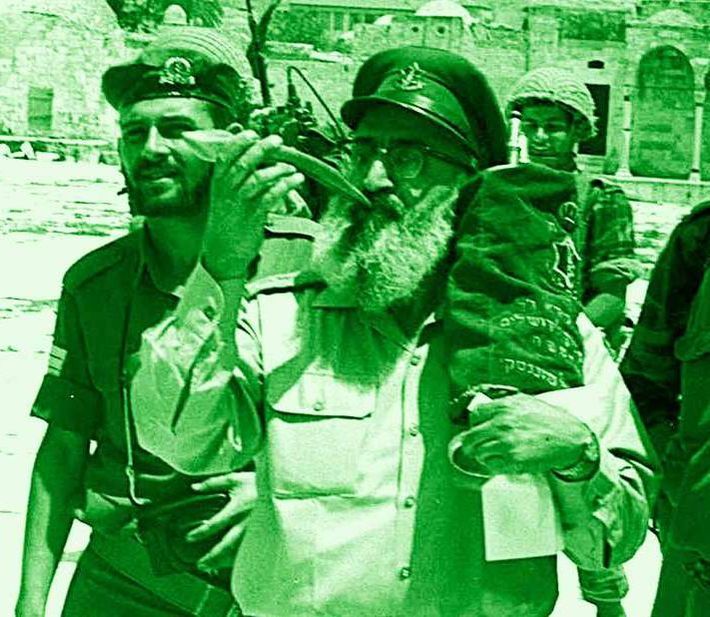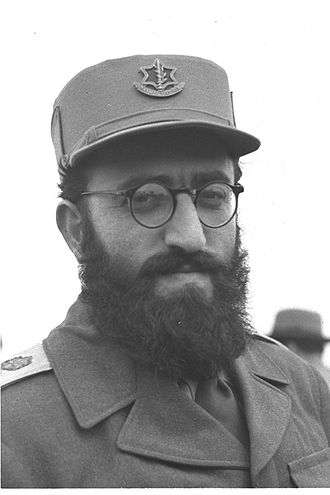HaRav Shlomo Goren Chief Rabbi IDF
|
Kosher meat revolution
LESS expensive |
|
1
שאלה: בעל משק שיש לו עדר של בהמות שכולן מולדות שהוצאו ממעי אמן מיד לאחר השחיטה, בגיל ח' חדשים להריון, מה דין העדר לענין שחיטה, טריפה ושאר דינים, ובאלו אמצעים על בעל העדר לנקוט כדי שיהיה נאמן?ו"ב QUERY - Regarding a herd of BP, bred exclusively from BP that originated as non-fully gestated foetuses - what is the status of this herd regarding
2
תשובה: ב"ה ח' באלול תשנ"ג לכבוד שואל לענין מר א ע שלומך ישגה, קבלתי את מכתבך מתאריך י' באדר תשנ"ג ולצערי נשתרבב המכתב ולא ראיתיו עד הנה, וחשבתי שמוטב מאוחר מאשר לא לענות כלל על שאלתך במכתבך הנך שואל וכותב:ם RESPONSE - 8 Ellul 5753; [Wednesday, August 25, 1993] Apologies for the delay. 3
בדין בעל משק ששחט מעוברות ונמצאו ולדותיהן בתוך מעיהן והם בני שמונה וחיו חלקם זכרים וחלקן נקבות, והכליאן זב"ז וכעת, כעבור זמן, נמצא ברשותו עדר שכולו אך מולדות הראשונים, הם ובניהם ובני בניהם you write asking: what is the Law of a herd of BP, that originated as non-fully gestated foetuses? 4
יורה לנו כת"ר מה דין עדר זה, ראשונים ואחרונים - לבעלים ומה הדין לאחרים?ם First, may the owners consume them as BP? May others also consume them as BP? 5
והאם נאמן (לענין שחיטה, טריפות, חלב, בו"ח, בכור וקדשים, אבר מן החי, אותו ואת בנו, מתנות - כהונה ועוד?) שאע"פ שהובאו הדברים בפוסקים לא נתברר לנו הדבר בהכרע הלכה למעשה Can this breeder be trusted for all matters? 1] Shechitah [that it does not require]; 2] Tereifos [that they do not disqualify] 3] Cheilev [that it is permitted]; 4] BBCh [that BP meat may be cooked with milk] 5] Bechor [that it's firstborn male is not sanctified]; 6] Kodashim [that it is not suitable for the MizbeAch] 7] Eiver Min HaChay [that it has no such restriction]; 8] Gifts for the Cohanim [that the Cohanim's portions from animals slaughtered for ordinary consumption do not apply to BP] We seek your guidance. 6
ועוד, מעיקר הדין, כיצד יהיו הסדרים על פיהם יהיה נאמן בלא שום פקפוק (כגון דידעינן שעת העיבור ושלא כלו חדשיהם ונשחטו בפני עדים והעדר כולו הוכר וסומן לבל יתערב בו זר וכיו"ב?ו"ב ?ועוד , אי אריך למעבד הכי בזמנינו What Halachic protocols guarantee that these animals are truly BP? Furthermore, is it appropriate to promote such BP in our times? 7
מן התאור של מכתבך אני למד שמדובר בבעל משק ירא שמים שהוא נאמן בדבריו ובמעשיו, והוא מעיד שהולדות שהוצאו ממעי אמן שנשחטה לא כלו להן חדשיהן אלא הם בני ובנות שמונה חדשים, דהיינו שנשחטה אמם בחודש השמיני להריונן Rav Goren now begins his response - It appears that this project is being managed by Gd fearing trustworthy people who can be relied upon to verify that the entire herd originated from non-fully gestated foetuses. 8
עפ"י ההלכה נחשבים הילדות כמתים, כמו ששנינו במס' שבת (קלה, א) לגבי אדם: ”בן שמנה הרי הוא כאבן ואסור לטלטלו". והוא הדין לענין לידה של בהמה גסה. כמו שאמרו במס' בכורות (ח, א). ואם כי אשה יולדת לז' חדשים, בבהמה נסתפקו בגמ' במס' נדה (כד, ב) אם יולדת לז' או לא. אבל מהמשנה במס' חולין (פ"ד מ"ה) וכן מהשו”ע יו"ד (סימן י"ג, ד) לענין בן פקועה, משמע שרק בן תשעה חדשים אם פרסה ע”ג קרקע טעונה שחיטה. אבל פחות מזה. אפילו בן ז' דינו כבן ח' ודינו כמת שניתר בשחיטת אמו, בניגוד לספק שנסתפקו בגמ' נדה אם בהמה יולדת לז' חדשים The Halacha deems these animals, in certain respects, to be dead, as we see in the Gemara Shabbos, 135a regarding humans - a baby born in its eighth month of gestation is deemed to be unviable, and it is therefore Muktzeh, it cannot be moved during Shabbos; and the Gemara Bechoros, 8a, suggests animals with a 9 month gestation are equivalent in this respect to humans. Now, although human babies at 7 months gestation are deemed viable [unlike 8 month gestated babies that are deemed unviable] and the Gemara Nidah 24b, considers this might also be true of animals; it is nevertheless clear from the Mishnah, Chullin 4:5, and the Shulchan Aruch, YD 13:4, that animals of 7 months gestation are certainly deemed to be dead. If they were deemed to be alive they would be subject to the same concerns of Maris Ayin as the fully gestated BP and would require Shechitah once they have walked about. However, BP found at 8 or 7 month gestation are deemed to be dead ans are therefore not subject to this decree. 9
והנה, אע”פ שלפי חכמת הגניקולוגיה היום אין מחזיקים ילד בן ח' חדשים כמת, לא באדם ולא בבהמה, ולפי דעתם של חכמי המדע בן ח' חדשים יש לו תוחלת חיים יותר מבן ז', בניגוד להלכה, מכל מקום אנו אין לנו אלא ההלכה המקובלת, שיתכן והיא הלכה למשה מסיני, כמו כל שיעורי תורה, כמו שאמרו במס' סוכה (ה,ב): "שיעורין חציצין ומחיצין הלכה למשה מסיני”ם Even though today, we know that babies born in the eighth month are fully viable, indeed their viability is more secure than those born in the seventh month [contrary to the rulings of the Gemara and Halacha] nevertheless, we are bound exclusively by our Halachic traditions, likely in this case to be Halacha LeMoshe MiSinai [Succak 5b] 10
ולכן, כל שאנו יודעים בברור שהולד הוא בן שמנה חדשים ולא נכנס לחודש התשיעי, דינו כמת לפי ההלכה. כי אם נכנס לחודש התשיעי, למ”ד בבכורות שלמדין בהמה מאשה, גם בהמה יולדת למקוטעין. לכן, כל שההריון של הבהמה הגסה נכנס לחודש השמיני ונשחטה אמו, אע”פ שאם היה העובר בן ט' חדשים חי כשנשחטה אמו, אם הפריס ע"ג קרקע טעון שחיטה מדרבנן, כמו שנפסק בשו”ע יו"ד (סימן יג ס' ב). אם לא כלו חדשי ההריון והן לפני ח' חדשים, או אם היה בן ח' חדשים כשנשחטה אמו, מותר הולד ללא שחיטה אפילו הפריס ע”ג קרקע Consequently, if we are certain that the BP is found as a foetus before it has reached its ninth months of gestation, Halacha deems it to be dead. However, once it has entered its ninth month we must consider the opinion that even before the ninth month of gestation is completed, it is deemed to be fully gestated and a BP found as a fully gestated foetus requires Shechitah Miderabbanan once it has walked about. Accordingly, the BP found anytime before it has reached its ninth month of gestation does not requires Shechitah even after it has walked about. 11
ואפילו אם מתהלך בשדות ורועה כמו שאר בהמות אינו טעון שחיטה, כמו שהביא בספר "דרכי תשובה" יו"ד (שם ס"ק טז) בשם גדולי המחברי ביניהם בספר ”מזמור לדוד” להגאון מוה”ר דוד פארדו שמכריע בדבריו שכל שלא כלו לו חדשיו אין צריך שחיטה אפי' הפריס ע"ג קרקע. וכן פסק בספר "כנפי יונה” שבן ח' שיצא חי אין צריך שחיטה אף שהפריס ע"ג קרקע, וכתב שכן משמע מדברי הפוסקים. ועיין בספר ”דעת תורה" (יו”ד שם ס”ק ז') מה שכתב בשם העיטור Even if it lives for many years and is essentially indistinguishable from ordinary animals, it does not require Shechitah, as is Paskened by the Darchey Teshuvah, 13:16 quoting many great authorities including the Mizmor LeDavid and the KanFey Yona. The Darchey Teshuvah also understands that this is the position of many great authorities. See also DaAs Torah YD 13:7 re his explanation of the Ittur. 12
לפי"ז יוצא שאם בטוחים שאמן של הולדות נשחטה כשלא כלו חדשיהן לולדות, או שנשחטה אמן בחודש השמיני להריונן, אע”פ שמסתובבות בשדות. מותרות הן ללא שחיטה. ואם יש מהן עדר שלם שכל העדר, זכרים ונקבות, נולדו בודאות בחודש השמיני להריונן, או אפי' לפני כן ולא כלו חדשיהן ונשחטה אמן לפני החודש השמיני, אע”פ שחיים הם בחוץ כמו שאר הבהמות, אינן טעונות שחיטה. זאת מפני שיש לסמוך על השיטות הסוברות שבניגוד לאדם, אין בהמה גסה יולדת לשבעה Accordingly, the BP foetus which is assuredly found at eight months gestation [where all agree it is not viable] or even as a seven month gestationed foetus [where some hold that it can be viable] does not require Shechitah, even though it grows, develops, lives and grazes like an ordinary animal. Furthermore, even if one has a large herd of such animals, they do not require Shechitah. Although some opine that animals are like people inasmuch as they can give birth to viable babies of 7 month's gestation, we do not Pasken like this. 13
ואע”פ שבירושלמי במס' יבמות (פ"ד הלי”א) מפורש שבהמה גסה טהורה אין זמן לידתה קבוע כמו בהמה גסה טמאה, ויולדת פחות מתשעה ירחי לידה, אין הדבר אמור בז' חדשים, מכיון שגם בבן ט' חדשים שנשחטה אמו שהפריס ע"ג קרקע, אינו טעון שחיטה אלא מדרבנן, מפני מראית עין, כמבואר בשו”ע יו"ד הנ"ל, כל שנשחטה אמן כשלא כלו לעובר חדשיו, אפשר להקל שלא יהיו טעונין שחיטה כלל. אלא אפשר לאוכלן ללא שחיטה שלהן על סמך שחיטת אמן, כמו שפסק בדרכי תשובה The Yerushalmi, Yevamos 4:11, which rules that Kosher species large animals do not have a set time for their gestation, is not saying that seventh month gestationed babies are viable [but that babies are viable once they entered their ninth month] Therefore, BP found before entering their ninth month do not require Shechitah. Such Shechitah is only MiDeRabbanan due to Maris Ayin, and we should certainly be lenient therefore when the bay has not yet entered its ninth month. 14
גם לענין טריפה אינן צריכין בדיקה מטריפות ושאר השאלות ששאלת עליהן, לאחר הכרעת ה"דרכי תשובה" הנ"ל שכתב שבלא כלו להן חדשיהן או שנשחטה אמן בחודש השמיני להריונן דינן כבן פקועה, שאינן טעונות שחיטה אפי' כשהן חיות בחוץ שדינן כהפריסו ע"ג קרקע Furthermore, following the compelling ruling of the Darchey Teshuvah regarding BP that originate from foetuses that did not yet enter their ninth month, there is no need to check that these animals are free from ritual blemishes, nor any of the other issues you asked about. These BP do not require Shechitah after they have walked about and even if they are completely indistinguishable from ordinary animals. 15
אולם פסק דין זה תלוי בנאמנות בעל העדר שלא נרבעו האמהות מבהמות אחרות אלא מבהמות שדינן כבן פקועה ונשחטה אמן בעודן בהריון. כי אם אין נאמנות כזאת הרי נכנסים לספק איסור תורה, כמו שנפסק ביו"ד (סימן יג סעיף ד) בן ט' [חדשים] חי שנמצא במעי שחוטה כשרה וגדל ובא על בהמה דעלמא והוליד, אותו הולד אין לו תקנה בשחיטה However all this requires that those responsible for raising these herds can reliably testify that these animals are all pure bred BP 16
אבל כשנאמן עלינו בעל העדר שנרבעו כולן מבני ובנות פקועה, הרי נפסק בשו"ע יו”ד הנ"ל שאם בן פקועה בא על בת פקועה כיוצא בו "הרי בנו ובן בנו עד סוף כל הדורות, כמוהו". אע"פ שבמקרה כזה כתוב שכולם צריכים שחיטה מדבריהם, אין זה אלא בבן ט' חדשים שנמצא במעי אמן השחוטה. שאז קובעת ההלכה שאם הפריס ע”ג קרקע טעון שחיטה מדרבנן. אבל בנידון דידן שאלת על אלו שנולדו מבני ח' שנשחטה אמן כשהם חיים וממשיכים לחיות בעדרים, בכהאי גוונא גם אם הפריסו ע”ג קרקע אינן טעונין שחיטה אפילו מדרבנן. כמו שפסק כ”דרכי תשובה" הנ"ל When those responsible can reliably assure us of the integrity of the herd being pure bred BP, and that all the BP are bred from initial BP that were found before they entered their ninth month, then the entire herd does not require Shechitah even after they have walked about as is the Pesak of the Darchey Teshuvah 17
כל זאת כשברור לנו שכל אחד מבני הפקועה שבעדר בא על בני פקיעה אחרים מסוג זה שנולדו בני ח' משחיטת אמן, שאז כל העדרים אינם טעונים שחיטה לא מדאורייתא ולא מדרבנן ואין עליהם גם דיני טריפה. כמו שנפסק שם בשו”ע יו”ד (סימן יג סעיף ד) שאין הטריפות פוסלת בהם. וכן אין צריך לנקר מהם את החלב ואת גיד הנשה. כמו שנפסק בשלחן ערוך יו"ד (סימן סד סעיף ב): "השוחט את הבהמה ומצא בה עובר בן שמונה או בן תשעה, בין חי בין מת, חלבו וגידו מותר"ם Since we are certain that these animals are all pure bred progeny of BP that were initially found as foetuses that had not entered their ninth month, they do not require Shechitah, they do not require removal of their Gid HaNasheh, nor their Cheilev fats. 18
ואע”פ שבעל השו”ע מסיים שם: ”ויש אומרים שאם שלמו לו חדשיו ומצאו חי, אע”פ שלא הפריס ע"ג קרקע, חלבו אסור וחייבין עליו כרת ומוציאין ממנו כל החוטים והקרומים האסורים בשאר הבהמות”, אין זה אלא כשנשחטה אמן כשכלו לה חודשיהן. אבל בנידון דידן כשאלתך שמדובר כשנשחטה אמן בחודש השמיני או לפני כן שלא כלו להן חודשיהן, שבררנו שאינן טעונות שחיטה אפי' הפריסו ע”ג קרקע, כמו שפסק ב"דרכי תשובה" להגאון ראב”ד ממונקאטש הנ"ל, הרי קל וחומר בן בנו של קל וחומר שהחלב והגיד מותרים. כמו שפסק בשו”ע יו”ד, סימן סד סעיף ב Do not be confused by the opinion brought in the Shulchan Aruch that requires the removal of the Cheilev and Gid, and that they are prohibited by Torah Law; this refers only to the BP found as a fully gestated foetus. In our case where the foetus has not yet entered its ninth month, and which do not require even Shechitah and even after they have walked about, there is absolutely no doubt that their Gid and Cheilev is also permitted. 19
ביחס לשאלתך כיצד יהיו הסדרים על פיהם יהיה נאמן בלא שום פקפוק (כגון דידעינן שעת העבור שלא כלו חדשיהם ונשתטו בפני עדים והעדר כולו הוכר וסומן לבל יתערב בו זר וכיוצ"ב), התשובה היא שיש לערוך רשימה עדכנית ומדוייקת מתי כל בהמה נכנסת להריון וממי נכנסה להריון ומתי נשמטה האם. יש לנהל פנקס מדוייק בנושאים אלה, כך שלכל בהמה תהיה כרטסת זהוי עליה ועל הריונה וע”י מי היא נרבעה, ולהזהר מלהביא את הבהמות הללו עם בהמות מעדרים רגילים. ע"י כך יהיה כל העדר תחת פיקוח מתמיד, שייכללו בו רק בני ובנות פקועה מהסוג של אלו שנשחטה אמן כאשר לא כלו לעוברים חדשיהם. אם הפיקוח והרישום יהיו קפדניים ויעמדו תחת השגחה של תלמידי חכמים יראי שמים, אפשר גם כיום לקיים עדרים כאלו Regarding your query - what is required to provide the necessary assurances, the answer is: Gd fearing Torah scholars must oversee that a precise and comprehensive record be maintained of every animal; when it conceived, the identity of the sire; and when the birth occurred. There must also be established systems to prevent these animals mixing with non BP animals. 20
אם כי עד כה לא שמענו על קיום של עדרים כאלו בעולם. אבל לא ראינו אינה ראיה זהו מה שהעליתי במצודתי בשאלות אלו. וה' ינחנו בדרך האמת בברכת התורה שלמה גורן Although it is true that we have never heard of such a project being undertaken - that proves nothing. This is what I have discovered in my researching this query - May HKBH lead us on the true path with Torah Blessings SG |
HaRav Goren married Tzfia Cohen, Rabbi David Cohen's [the Nazir of Jerusalem] daughter. Rabbi She'ar Yashuv Cohen, former deputy-mayor of Jerusalem and later Chief Rabbi of Haifa married her sister. HaRav Goren famously pronounced the blessing of thanksgiving at The Western Wall, broadcast live to the entire country, when East Jerusalem was liberated on 7 June 1967. He sounded a Shofar, carried a Sefer Torah scroll, and presided at the first Jewish prayer service at the Western Wall since 1948. Immediately after the Israeli War of Independence, he engaged, often at great personal risk, in bringing the scattered abandoned remains of soldiers to honourable Jewish burial. He strongly opposed the idea of separate religious and secular units and worked for the integration of all soldiers in united army units. He was the most prominent expert Halachic authority setting the guidelines and rulings for army service. The Greatest Honour and Endorsement Dayan Pinchus L Padwa, senior Dayan of the Belz International Kashrus authority, Chief Rabbi of Amsterdam, and Head of the The Rabbinical Centre of Europe (RCE) Kashrus Department; proudly enjoying Rabbi Rabi's Australian Ben PeKuAh beef. |





